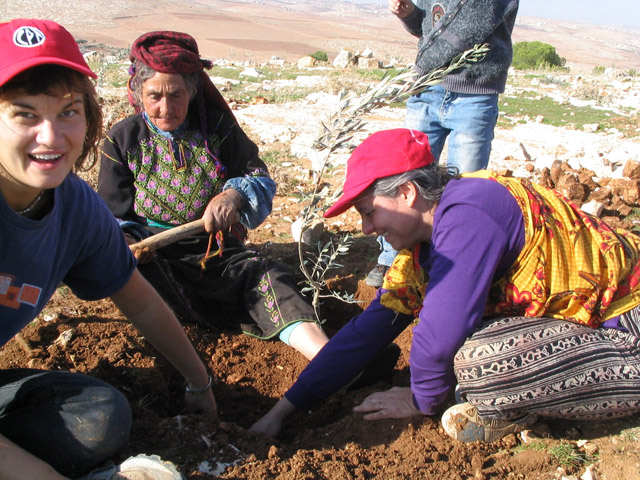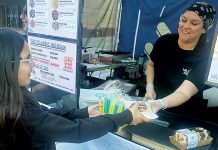
Local woman’s life is wrapped in non-violent work for
justice
It might be such a predictable life: a dedicated student grows
up in a small town, part of a family of educators and social
activists, goes on to attend a small, private, church-affiliated
university, becomes a pastor and starts leading a quiet daily
existence devoted to others.
Local woman’s life is wrapped in non-violent work for justice
It might be such a predictable life: a dedicated student grows up in a small town, part of a family of educators and social activists, goes on to attend a small, private, church-affiliated university, becomes a pastor and starts leading a quiet daily existence devoted to others.
But just behind her warm and almost-constant smile, Carol Rose leads a life far removed from quiet and predictable.
Rose is a director at Christian Peacemaker Teams, a modest organization with a global reach. The group’s mission is best stated in the form of a question, one the organization presents as part of its credo.
What would happen if Christians devoted the same discipline and self-sacrifice to nonviolent peacemaking that armies devote to war?
The answer to that question is tucked neatly into CPT’s mission statement: Reducing violence by getting in the way.
Sitting on a couch in her parents’ neat Sunnyslope-area home, Rose at first gives away nothing of her daily life. Wearing a black CPT T-shirt with long, straight hair pulled behind her shoulders, she appears like nothing so much as a 40-ish school teacher. As she talks, she occasionally taps at a laptop computer loaded with scores of photos of people accomplishing the CPT mission.
After graduating from San Benito High, where her father, John, was once director of curriculum, Rose attended Whitworth College in Spokane, Wash. The school is affiliated with the Presbyterian Church, where Rose’s family worshipped. After graduating with an emphasis on ministry, Spanish and education, Rose experienced an epiphany of sorts.
In high school, she spent a year as an exchange student in Thailand, and her world quickly grew beyond the boundaries of Hollister. Several professors at Whitworth were outspoken in their interest in peace and justice. A question emerged.
“So, why war?” she asked.
“Christian-based ethical living in the world; that’s part of what I grew up with,” she said. “The world ought to be better because we lived here.”
Rose was just a few hours away from demonstrating that commitment, by standing on a corner as part of a continuing effort to peacefully protest U.S. military involvement overseas. As commuters rushed back into town, she was there with her parents, part of the weekly “Hollister in Black” effort.
It’s that commitment to action that conforms with the personal ethics that shape Rose.
Although she grew up a Presbyterian, and attended a Presbyterian university, Rose was called in a different direction. Today, she is a Mennonite minister precisely because the church has a history of social action.
“When the U.S. was sponsoring a variety of wars in Central America, I found exciting things were being done by the Mennonite Church. I worked there for several years doing the kind of work CPT does now, but CPT didn’t exist then.
“I found if there were outsiders present, the Honduran military was less likely to kill people. On the side I would do nutrition education or literacy work. That got me thoroughly into this kind of work.”
Simply put, “this kind of work” – inserting oneself nonviolently into harm’s way – is the mission of CPT.
Rose had just returned from Palestine before visiting with her parents. In may, she led thousands in an ecumenical service in Colombia that accompanied a daylong general strike.
“If you say you’re for peace but you’re not willing to risk for the sake of peace, that doesn’t make sense,” she said. “Are Christians willing to risk for peace non-violently?”
A few minutes with Rose makes it very clear that non-violence does not carry a prohibition against outspokenness.
Rose, fresh from Hebron, was blunt in her view of U.S. involvement in Israel.
“If you have a religious state, you can’t have a democracy,” she said. “If something’s going to change, it needs to change here, too. The occupation of Palestine is not going to stop as long as the U.S. keeps writing a blank check.”
That may run counter to the popular view of the U.S. role in the Middle East, but Rose’s experience and studies present an eloquent case.
She presents two photos on her laptop. The first is of a dirt track, blocked with mountains of rubble. She said that the road is the only route to and from a Palestinian settlement, and that it is blocked by Israeli armed forces with the rubble of what were once Palestinian homes. For people trying to bring goods to market, or to attend university classes, the roadblocks present an impossible barrier – economic warfare.
The next picture shows a stretch of pristine pavement.
“This is a government road that Palestinians are not allowed to use. That’s called segregation,” Rose said. “It’s not about security for Israel; it’s all in the West Bank.”
Rose sees a clear agenda: to remove Palestinians from Israel.
“If you look at where the (Israeli) settlements are and at the aquifers, they match.”
The government of Israel controls the availability of water, and Palestinians are entitled to less than Israelis. Checkpoints are frequent.
“That’s something CPT monitors,” she said. “If a person’s been held longer than 20 minutes, we call an organization connected to the U.N. and they have more leverage. If they use violence, we intervene. We can take pictures – ‘this is going to be in your mother’s newspaper.'”
Because CPT’s mission is to end conflict non-violently, the organization’s staff of 42 full-time and 170 part-time workers and volunteers is frequently on the front lines.
Last year, four volunteers were kidnapped in Iraq, but released some months later.
“In the context of the current occupation of Iraq and the current occupation of Palestine and the history of the Crusades, it’s amazing that they’re willing to step up and say, ‘these are peacemakers. Let them go. It’s against our faith.'”
Israel is the intersection of the roots of three of the world’s great faiths: Judaism, Islam and Christianity. And it is in Israel where that long history, and shared beginnings, plays out most dramatically.
CPT only goes where it is invited. The invitation to work in Palestine came as the result of fear that an ancient culture is being erased.
“The community as a whole was concerned about the loss of the old city of Hebron,” she said. “It’s a very Muslim city, a city that has deep history for both Jews and Muslims. It’s the place where Abraham and Sarah are buried. There’s a long history, Biblical and otherwise.”
There’s good reason to fear that Hebron is imperiled. A village nearby is slated for destruction by government workers.
“There’s a demolition order for every building in the village,” she said. “Here’s a 400-year-old house. The demolition order was issued because it didn’t have a building permit.” Rose stops and smiles, shaking her head at the absurdity of building permits for dwellings that were old before the United States existed.
As critical as she can be of U.S. foreign policy, Rose forgives some of Israel’s politics.
“As Christians, we need to have a very clear picture of the history of Christian anti-Semitism,” she said. “Jewish people, with good reason, have a deep distrust of their place in the world.
“I think this [non-violent co-existence] could be good Jewish theology as well. Our only security is in God.”
That day is a long way away, she said.
“I think there’s something close to idolatry in Israelis in relation to the state. It’s in the U.S., too.”
But there is cause for hope. Growing numbers of Israelis are beginning to work toward peace in their homeland.
“There’s a rabbi who talked about getting in the way of a bulldozer about to demolish a Palestinian house,” she said.
“The level of non-violent resistance in Palestine is quite phenomenal,” Rose said. “In Tuwani one of the ways they do it is just by sending their kids to school, by farming their land even though it’s at the edge of settlements.”
When school children were assaulted by Israeli settlers, CPT staff members began walking them to class every day.
“The Hague International Court has issued a ruling that the [Israeli West Bank] settlements are illegal,” Rose said. “They make a show of dismantling settlements here and there and then they reconstruct them with government support.”
The Palestinians have learned lessons by studying the U.S. civil rights movement, she said. “It’s a real privilege to be able to walk alongside them as they push those edges [boundaries] out.’
CPT is not only present in the Middle East and Colombia. The organization populates the U.S. border with Mexico, trying to ensure that people do not die in the desert in search of jobs in America. Teams are in northern Canada, where logging operations threaten to destroy native cultures.
“There’s no place to stand neutral in a war zone.”
For more information, go to www.cpt.org.









